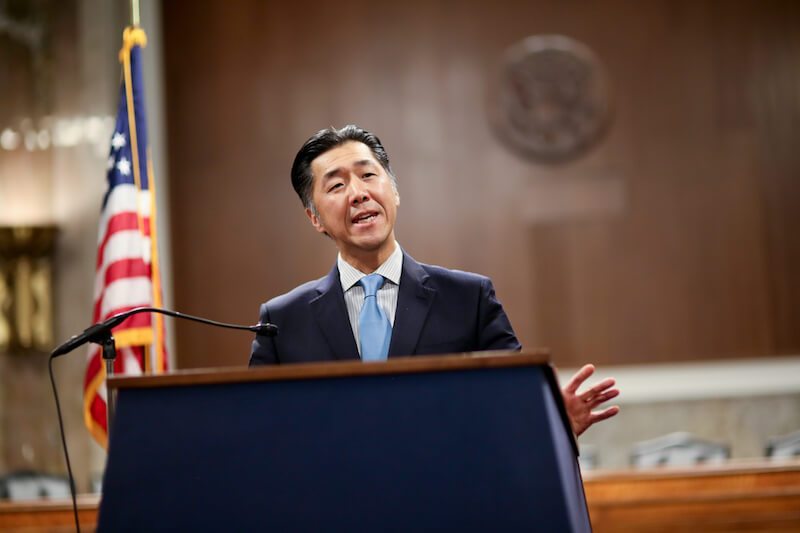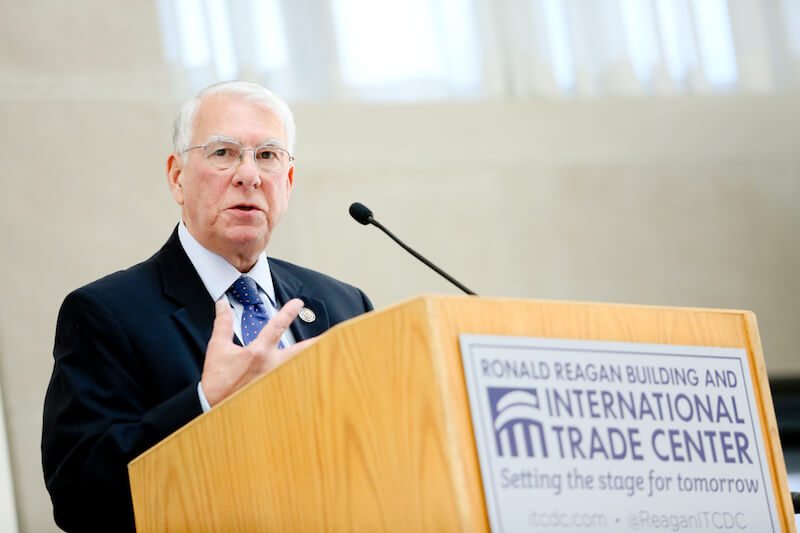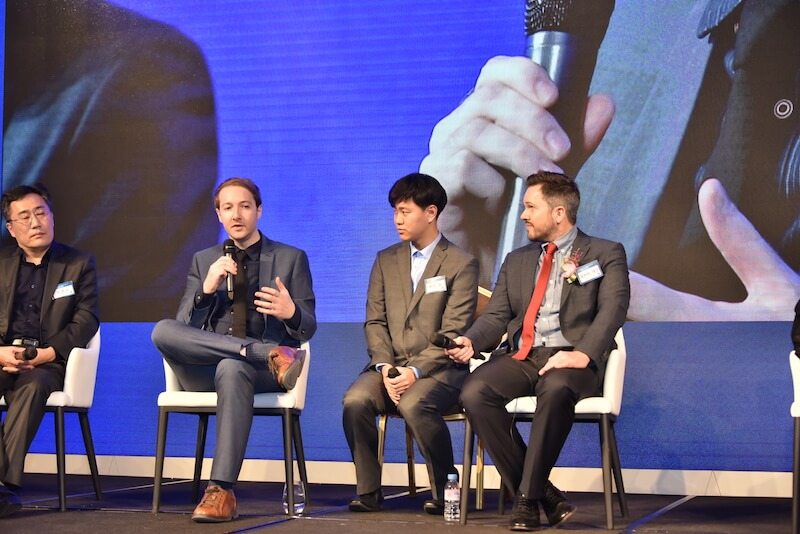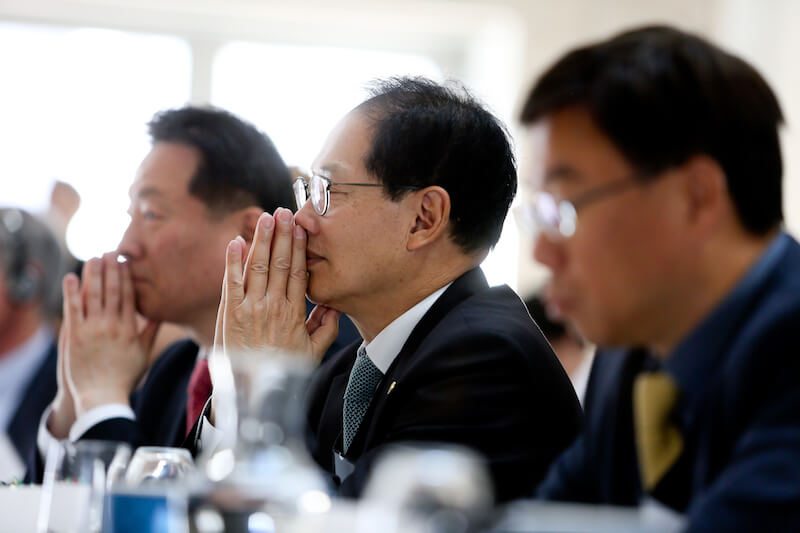“Now is the time for far-reaching vision and bold action. Korea’s historical quest for one free, independent sovereign nation is within reach. As a nation established on the ideal of benefitting all of humanity, Korea can stand as an example to the world.” -Dr. Hyun Jin P. Moon (International Forum for One Korea, November 11, 2017)
The entire global community focused on Korea in 2017 as North Korea moved closer to securing a nuclear intercontinental ballistic missile. President Trump visited South Korea in November, setting a precedent for U.S.- ROK relations that made it clear – the Korean peninsula is one of the most important priorities in U.S. foreign policy.
Yet, the way forward to resolving the crisis on the peninsula is still hotly debated among experts and policy makers. Only two options seem to be available: direct military confrontation or to hinge global security on an increasingly erratic game of high-level diplomacy. Yet, neither option can hope to fully resolve the issue of nuclear weapons or contribute to global peace.

Dr. Hyun Jin P. Moon gives the keynote address at the International Forum on One Korea in Washington D.C.
A Third Way to Denuclearization
In the midst of rising concerns and fear, Dr. Moon has called the global community to see the situation as an opportunity to point instead to a third way to deal with the nuclear crisis. In short, he points to reunification as the best possible solution to deal with both the threat of nuclear war and open new possibilities for growth and development across the entire Northeast Asian corridor.
This third way is based on a vision of a new, reunified Korea, founded on enduring values of the spiritual heritage of the Korean people, namely the principles of Hongik Ingan. Hongik Ingan espouses the dream of a Korea as a model nation that honors the dignity and freedoms of its people, and ultimately brings “broad benefit” to all humanity.
In his book, Korean Dream: A Vision for a Unified Korea, Dr. Hyun Jin Preston Moon maps out four elements of such a vision:
- Building consensus on a “Korean Dream,” one which is based on time-honored principles of the Korean heritage, Hongik Ingan, a mandate for all Koreans to live to benefit humanity.
- Strengthening the traditional values of the Korean family. Dr. Moon writes that the Korean family has been the “crown jewel” of the Korean people. However, this precious institution is being threatened in the rush for economic development and modernization. The erosion of the extended family model has weakened social cohesion, given rise a plethora of social issues, and weakened the values that have preserved the ideal of Hongik Ingan through the ages. The traditional extended family model of Korea is part and parcel of the Korean Dream, and it also provides practical, social and economic safety nets that become a resource for the inevitably long process of unification and post-unification development.
- Fostering a spiritual environment that can animate the vision of the Korean dream with the moral authority of moral and innovative leaders who can guide a people and society undergoing transformation. Such an environment can also foster important values such as responsibility, interconnectedness, forgiveness and sacrifice, important moral foundations for a united Korea striving to become a model nation.
- A grassroots, bottom up effort. The power of civil society, of people united by a common vision for the greater good, is an absolutely necessary part of the success of the Korean Dream. The Korean Dream challenges existing paradigms of development by putting social and cultural engagement as the first step to political change, which would finally open the doors for socioeconomic opportunities. Rather than relying on artificial or superficial political or economic fixes, Korean reunification will require the power of virtuous, engaged citizenry working for the greater good of all humanity.
Korean unification will obviously be a long and, at times, treacherous path. It will require a change in perspective that considers not the short-term immediate crisis of denuclearization and conflict mitigation, but will require a commitment to a long-term, vision driven perspective towards unification and national development.
Yet considering that Koreans are and have always been one family, isn’t it the obvious choice?
The Korean Dream in 2017
Thus, the work of coalitions such as Action for Korea United, a Korea-based organization of over 900 civil society organizations, is imperative to awaken the Korean people to the dream of a unified Korea.

President of the Korea Economic Institute of America, the Hon. Donald Manzullo declares the inevitability of Korean reunification at the International Forum on One Korea in Washington D.C. in November 2017
In his speech at the One Korea International Forum in Washington D.C., former U.S. Congressman and current President and CEO of the Korea Economic Institute of America, Hon. Donald Manzullo, said “Unification is the inexorable and inevitable goal of the peninsula…When inevitability is assumed, the focus shifts, not from if, but when and how.”
Action for Korea United and its growing network of partners. including the Global Peace Foundation, the One Korea Foundation, and the East West Institute, have worked to develop such a shift in the minds and hearts of Koreans around the world. It made significant progress in 2017 through the One Korea Global Campaign with new and unprecedented accomplishments. Among them are:
- 10,000 people at the One K Global Peace Concert 2017 in Manila, Philippines
- High-level international forums in Washington D.C. and Seoul that fostered dialogue, consensus and support for a Korea-led movement for Korean unification.
- The release of the song, “Korean Dream,” written and produced by the five-time Grammy award winning production team of Jimmy Jam and Terry Lewis, featuring award winning international artists like Peabo Bryson and Dami Im.
- Local, grassroots Korea-based efforts to promote and prepare for unification.
The Korean Dream Model of National Transformation
As the Korean Dream moves from vision to reality, it is unfolding a process of national transformation to build a nation that benefits the world.
At the 5th Action for Korea United Leaders’ Assembly, Dr. Hyun Jin Preston Moon called the issue of Korean unification “the civil rights issue of the 21st century.” Korean Unification, he said, would “bring to an end the terrible chapter of colonialism that the Korean people had to endure during the first half of the 20th century. It will close the book on the subsequent tragic episode of a Korea divided because of Cold War realities. And it will bring to the fore, among both the Korean people and the global community as a whole, the Korean Dream which encapsulates our ancient founding ideals that have defined us as a people and shaped our sense of national purpose to create an ideal nation whose goal is to serve all of humanity.”

Creative artists from around the world discuss their inspiration to participate in the international campaign for One Korea at the 5th Anniversary Assembly of Action for Korea United
The process of Korean’s national transformation into a model nation for the world is outlined in in the Korean Dream: A Vision for a Korea United:
- It begins with a vision that captures the hearts and minds of the people,
- Leading to social transformation
- Which gives rise to political and social stabilization
- Creating the foundation for economic development.
Dr. Moon is at the fore, leading efforts in various civic, public and private, and intergovernmental arenas.
2018 will be a significant year, starting with the peace efforts during the Pyeongchang Winter Olympics, and leading into 2019, the 100-year anniversary of the March 1 Korean independence movement.
As the Korean people have proven through thousands of years of history, from every crisis, they can claim an opportunity to expand, advance and prosper. The current nuclear crisis can become the opportunity for the Korean people to lead a movement to bring about Korean unification and ultimately peace and prosperity not just for Korea and Northeast Asia, but the world.

